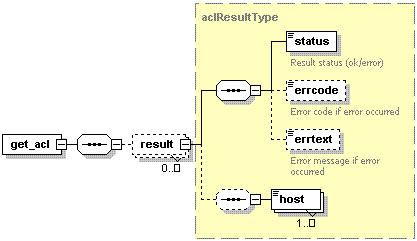Retrieving ACL
To retrieve the ACL of your name server, use the get_acl operation. This operation is available on Linux only.
Request Packet Structure
The get_acl operation in a request packet has the following graphics presentation:

Note: The interactive schema navigator for all request packets is available here: http://plesk.github.io/api-schemas/1.6.9.1/agent_input.svg.
Data type: none.
Response Packet Structure
The get_acl operation in a response packet has the following graphics presentation:

Note: The interactive schema navigator for all response packets is available here: http://plesk.github.io/api-schemas/1.6.9.1/agent_output.svg.
- The result node is optional. It is required in case when the
get_acl operation has succeeded, or when an error (if it
occurred) was not of a system type. Data type: resultType
(
common.xsd). - The status node is required. It specifies the execution status of the get_acl operation. Data type: string. Allowed values: ok | error.
- The errcode node is optional. It is used to return the error code when the get_acl operation fails. Data type: unsignedInt.
- The errtext node is optional. It is used to return the error message if the get_acl operation fails. Data type: string.
- The host node is optional. It is r equired if the del_acl operation has succeeded. Returns the IP address or name of hosts from ACL. Data type: string.